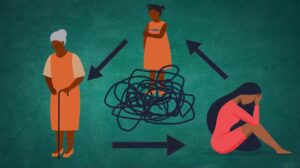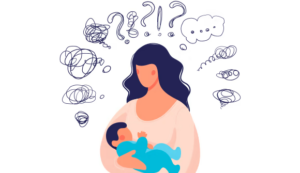Suresh had lost his job during the pandemic. He was the sole earning member of his family.
He thought of adding new skills to his resume by making use of the lockdown. This would enable him to have a first-mover advantage over others in getting a job in the course of time.
Initially, he was confident but with the passage of time and the lockdown period getting extended, he lost his vigor and determination.
He applied for jobs but was not getting any reply. He had to stay indoors. He had a family to support.
Negativity just got stuck in his mind and he feared for everything.
He practiced yoga and meditation but he lacked patience. He wanted quick results to the questions which arose in his mind.
He suddenly developed mood swings and used to get annoyed with tiny things.
Petrified by his mood swings, he spoke to his friend Sushant.
Sushant suggested him to find a CBT therapist online. On further probing, Sushant confided in Suresh that he was also suffering from anxiety and depression.
After communicating and talking his heart out to the CBT therapist online and after adopting the measures suggested by the CBT therapist, there was a complete transformation in Suresh.
After noticing these changes, Suresh is also helping others who are struggling with mental illness and depression and is suggesting them to find a CBT therapist online.
A CBT (Cognitive Behavioural Therapist) role is to discover the thought patterns and behavior of the people with regard to their life and relationships.
So what is Cognitive Behaviour Therapy?
Cognitive Behaviour Therapy is used to treat mental illnesses like depression, anxiety, bipolar disorder, and substance abuse issues.
It works on your thinking process, and how you perceive things or analyze the situations.
Its aim is to identify and change your disturbing or irrelevant thoughts. Example: A person thinks that he is good and confident; hence his positive thoughts will influence his behavior and feelings which will result in being happy and confident.
But if a person does not feel good about himself nor does he have the confidence, then this will lead to negative feelings and behavior. He will stop talking to people and will isolate himself completely.
The main motive of Cognitive Behavioural Therapy is to identify the reason behind the thinking process in a particular situation and thereby change the mindset which will eventually result in a change in feelings and behavior.
What Cognitive Behavioural Therapy Is NOT?
- It is not mysterious-Cognitive Behavioural Therapy is completely transparent in terms of what you are doing, how you are doing it, and how the treatment works.
It is similar to a car where you can open up the hood and see all the parts and you know how it is working.
- It is not aimless-The Cognitive Behavioural Therapy is very much goal-oriented. Not just offline but also online CBT for depression, anxiety and social anxiety are specific in their goals.
There are specific observable and measurable goals and you can identify how your symptoms are doing and where do you stand in relation to the goals.
- It is not a therapy where you will never develop new skills-In all the types of Cognitive Behavioural Therapies, there is one thing common is that they provide support to the individual /patient in developing new skills through new ways of dealing with thoughts, new ways of dealing with emotion and new ways to be in a situation.
- It is not a therapy where you will never get homework-The therapist gets out of your comfort zone by providing homework to the individual/patient which is mandatory.
A small part of the therapy involves getting yourself outside of the office.
- CBT is not stagnant-It is an active treatment. Many CBT treatments will at some point get you moving in some way. They will get you to practice something or will get you to act in some way.
Why CBT is important?
CBT is generally perceived as a practical therapy so the individual/patient acquires life-long skills in managing the symptoms of their mental health, which are challenging.
It is very much goal-oriented which means that it is highly effective in addressing those goals that you set for yourself.
It is a collaborative therapy, where you collaborate with your therapist in relation to your therapeutic journey.
Let’s look at how Cognitive Behavioural Therapy treats various mental health issues such as:
- Depression.
- Anxiety.
- Social Anxiety.
- Depression
Thoughts we experience are:
- Negative focus.
- Feeling gloomy.
- Being Self-critical like no one likes me, I have messed up again.
- Regret doing stuff in the past.
(Source: Everyday Health)
Feelings: Depressed
- Tired.
- No energy.
- Not motivated.
- Not interested.
- Slowed down.
Behavior: Withdraw & Isolate
- Staying home
- Cutting off from others.
- Not socializing.
- Not doing much.
How Online CBT for depression breaks this cycle and pattern of the patient?
Behavior: Start exploring
- Go out more
- Connect with others.
- Learn coping skills
- Carry on a hobby or activity which you used to enjoy doing.
- Daily plan to achieve, connect and enjoy.
Thoughts: Positive
- Challenge our thoughts.
- Not believe or pay attention to our thoughts.
- Notice the positives.
- Learn new skills.
Feelings: Mood uplift
- Energy increases.
- Anxiety
Thoughts we experience are: Triggered by a past event
- Something bad is going to happen.
- Future based or catastrophic
- Will not be able to cope.
- The focus of attention is taken up by fear.
(Source: Everyday Health)
Feelings: Anxious
- Tense.
- Heart racing.
- Breathing fast.
- Light-headed
- Sweaty.
Behavior: Avoid or Escape Situations
- Staying home.
- Make excuses.
- Leave early.
How Online CBT for anxiety breaks this cycle and pattern of the patient?
Thoughts: Learn STOPP skills.
- Challenge our thoughts.
- Not believe what our mind says.
- Not pay attention to our thoughts.
- Notice the positives.
- Learn new skills.
Behavior: Observant activity
- Make a plan to gradually do things that we normally avoid doing.
- Start small and build up.
- Stick with it in those situations.
- Learn coping skills
Feelings: Less anxious and more composed
- We will be calm.
- We will find out that every time we do the activities mentioned above, the anxiety reduces.
- Social Anxiety
Thoughts we experience are: Triggered by social situations.
- Something bad is going to happen.
- I will make a fool of myself.
- Others will think I am stupid.
- Looking for signs of what others think critically.
(Source: Cleveland Clinic Health Essentials)
Feelings: Anxious
- Tense.
- Heart racing.
- Breathing fast.
- Light-headed
- Sweaty.
Behavior: Avoid or Escape Situations
- Staying home.
- Make excuses.
- Do not go or Leave early.
- Smoke
- Hide in the corner.
- Fidget.
How does Online CBT for social anxiety breaks this cycle and pattern of the patient?
Thoughts: Learn STOPP skills.
- Challenge our thoughts.
- Not believe what our mind says.
- Not pay attention to our thoughts.
- Notice the positives.
- Learn new skills.
Behavior: Mindful activity
- Make a plan to gradually do things that we normally avoid doing.
- Start small and build up.
- Stick with it in those situations.
- Learn coping skills
Feelings: Less anxious and more composed
- We will be calm.
- We will find out that every time we do the activities mentioned above, the anxiety reduces.
To conclude, different types of mental illnesses can be treated with the help of Cognitive Behaviour Therapy.
You can either find an online cognitive behavior therapist or visit the clinic, the strategies and treatments used will be the same. You can also refer to CBT books and research them before meeting the therapist.
Feel free to reach out to us for counseling and psychotherapy sessions from our trained psychologists, and psychotherapists.




